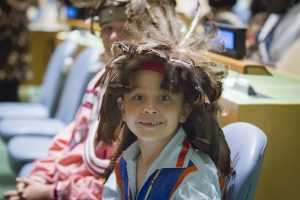
This week the United Nations opened the two-week long Permanent Forum on Indigenous Issues. Running until the 20th May, the theme for the 15th session is ‘Indigenous peoples: conflict, peace and resolution’.
The theme of this year will look specifically to the issues that continue to arise regarding territories and resources and the ongoing need to address the rights and distinct identities of indigenous communities.
The United Nations Permanent Forum on Indigenous Issues was established 28 July 2000 by General Assembly Resolution 2000/22, and functions as a high-level advisory body to the Economic and Social Council. Its aim is to provide expert advice and recommendations to the Council and other United Nations programmes and agencies. They are also responsible for promoting cultural awareness, using the yearly two-week sessions to discuss issues relating to development.
The six mandated areas that the UN Permanent Forum are implementing in this session are health, education, human rights, economic and social development, environment and culture. With reference the United Nations Declaration on the Rights of Indigenous Peoples, it is one of the primary chances for the Forum to have a dialogue with the other UN Agencies for Indigenous Peoples; the Special Rapporteur on the Rights of Indigenous Poples and the Chair of the Expert Mechanism on the Rights of Indigenous Peoples.
More than 1000 indigenous peoples will be in attendance, this year launching the System-Wide Action Plan in response to the 2014 forum where leaders agreed that a coherent approach was necessary for the future of all indigenous peoples. The intention for this plane is to encourage benefit and participation in the 2030 Agenda for Sustainable Development, the Addis Ababa Action Agenda, the Sendai Framework for Disaster Risk Reduction and the Paris Agreement on climate change.
Un Secretary General, Ban Ki-moon addressed the Opening Ceremony of the Forum by video link, “Indigenous peoples are increasingly being drawn into conflicts over their lands, resources and rights. Lasting peace requires that indigenous peoples have access to cultural, social and economic justice”.
To watch the Forum live, see the UN Webcam or check the UNPFII Twitter Feed for regular updates.